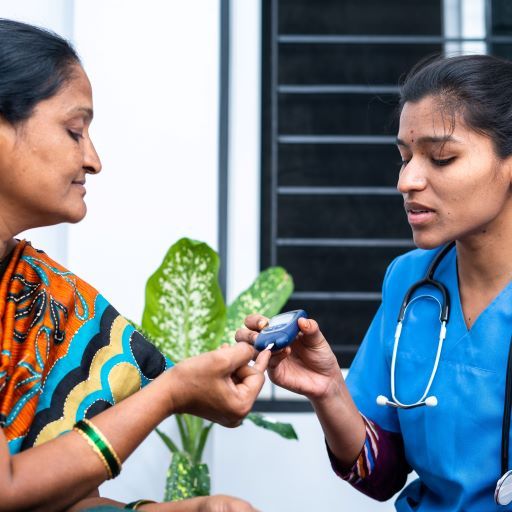
Are You Concerned About Diabetes?
If You Are Concerned About Diabetes
Diabetes is a disease that affects how your body turns food into energy. A lot of what you eat turns into sugar (glucose) and goes into your blood. As your blood sugar goes up your body produces insulin to let the blood sugar go into cells to produce energy. If you have diabetes your body doesn’t produce insulin (Type 1) or the cells don’t respond to insulin (Type 2), so too much sugar stays in your blood.
The biggest health risks of diabetes are associated with high blood sugar, which can increase the likelihood of blood clots and impaired blood flow by making cells sticky and blood vessels stiff. This can damage tissues, resulting in high blood pressure, heart attacks, stroke, kidney failure, blindness, and skin infections, especially on the feet. A blood test called Hemoglobin A1C (HgbA1c) can measure the effects of blood sugar on their cells over time. Regular measures of blood sugar will allow a person with diabetes or pre-diabetes to take measures to reduce their risks and improve their health.
Making deliberate food choices is an excellent way to manage your weight, which makes a difference to controlling diabetes. Here are some tips:
- Load up on proteins first-don’t leave yourself feeling hungry by the time you get to those side dishes!
- Choose high-quality plant-bases carbs instead of sugary items (e.g. sweet potatoes minus the marshmallows)
- Portions should always be small, with a variety of colors and textures-try shaving your veggies-looks are deceiving, so you’ll load your plate without needing large portion!
- Keep moving! Helping to set/clear the table are simple ways to get some steps in!
- Holiday baking can swap out white flour for a variety of options-no need to skip dessert if you plan right when baking!
Schedule activities such as walking, taking stairs, gardening, house cleaning, playing with a pet, anything that gets you moving!
If you have diabetes, we are here to support you, your care manager can assist you with making sure you see your PCP and specialist if needed (Diabetes doctor called an Endocrinologist). To support your best health, it is important to see your doctors regularly and make sure you take all medications as prescribed. Your doctor may take a blood sample to check your A1c (this is a test to check how much sugar has been in your blood over the last few months), this test is a great way to see how you have been doing managing your diabetes.
Schedule a visit with your doctor. And it’s always a good idea to have someone you trust come with you. Sometimes when we get to the doctor, we get nervous and don’t always hear what the
doctor is saying. Having a second pair of ears helps. Also, that person can help you remember all your questions and give you support during an exam the doctor may need to do.
Remember if you have any questions or need help to make an appointment, find a doctor to support you or need help getting your medication, your care Manager is here to help. For more information check out this helpful flyer.
Details can be found: https://www.prevention.com/food-nutrition/healthy-eating/g20495209/diabetes-friendly-thanksgiving-recipes/
Actual recipes: https://www.tasteofhome.com/collection/diabetic-friendly-recipes-for-thanksgiving/ and https://diabeticgourmet.com/recipes/holiday-and-special-occasions/thanksgiving-recipes
Visit Partners Health Plan's Health Resources to learn more about the diabetes as well as other informative health-related articles.
H9869_Diabetes Article_2022